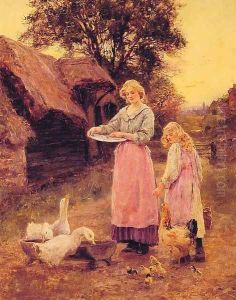Lilian Yeend-King Paintings
Lilian Yeend-King was a distinguished British artist, born in 1855 and passing away in 1924, who made significant contributions to the Victorian era's art scene. She was known for her vibrant and delicate paintings that often depicted idyllic scenes of women in landscapes, gardens, and domestic settings, showcasing her keen interest in capturing the beauty of everyday life and the natural world. Yeend-King's work is characterized by its luminous color palette, detailed textures, and the gentle, often contemplative, portrayal of her subjects.
Educated at the Royal Female School of Art and later at the Royal Academy Schools, Lilian Yeend-King was part of a generation of female artists who began to gain recognition in the art world, a domain that was predominantly male-dominated at the time. Her education and talent enabled her to develop a distinctive style that combined elements of realism with a certain poetic sensitivity, making her paintings highly sought after during her lifetime.
Throughout her career, Yeend-King exhibited widely, including at prestigious institutions such as the Royal Academy, the Royal Society of British Artists, and the Society of Women Artists, among others. Her work was celebrated for its ability to capture the essence of English rural and domestic life, often reflecting the Victorian fascination with the countryside and nature as sources of beauty and inspiration.
Despite the challenges faced by women in the arts during the Victorian period, Lilian Yeend-King carved out a successful career for herself and was recognized by her contemporaries for her contributions to British art. After her death in 1924, her legacy continued through the appreciation of her work by collectors and art historians, who regard her as an important figure in the transition from Victorian to early 20th-century British art. Yeend-King's paintings remain a testament to her skill in portraying the simplicity and elegance of the world around her, capturing moments of tranquility and the intimate connection between humans and nature.
